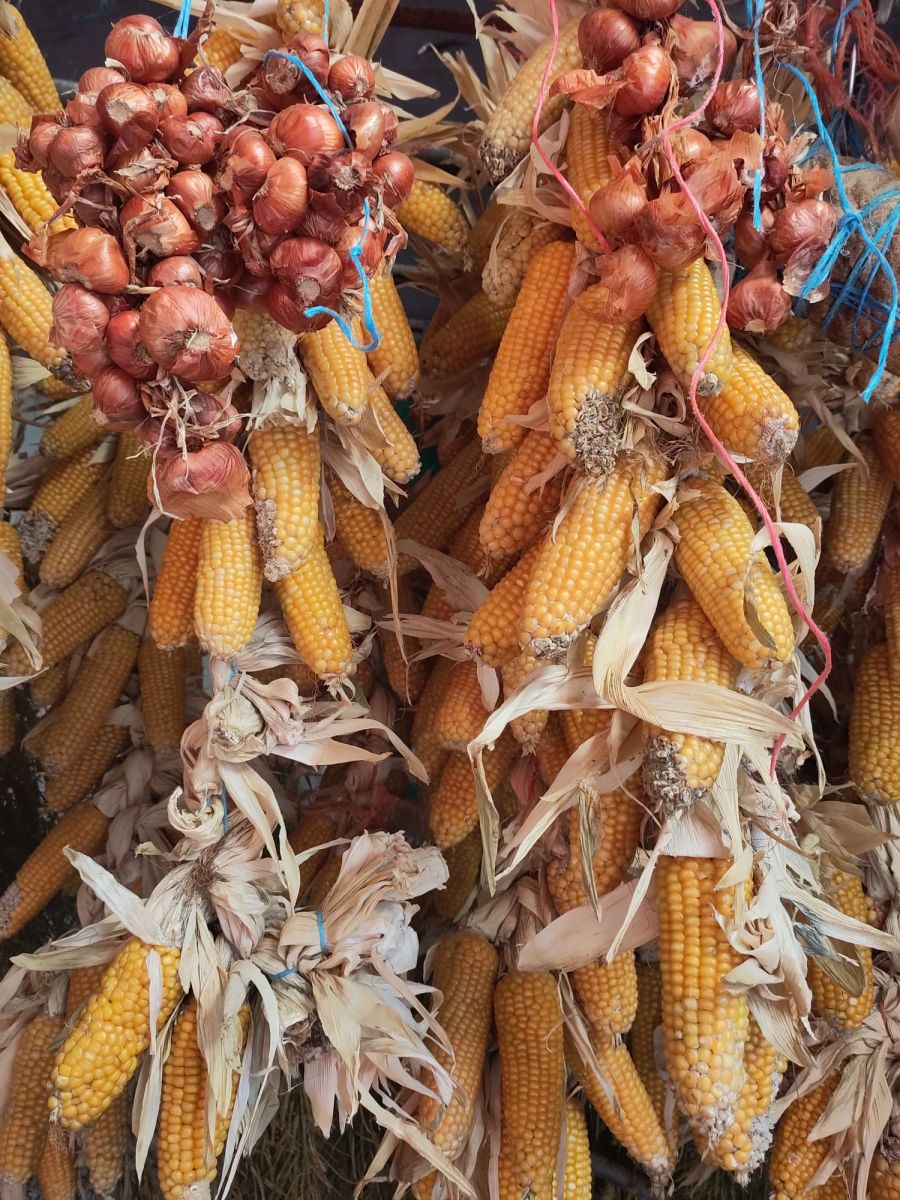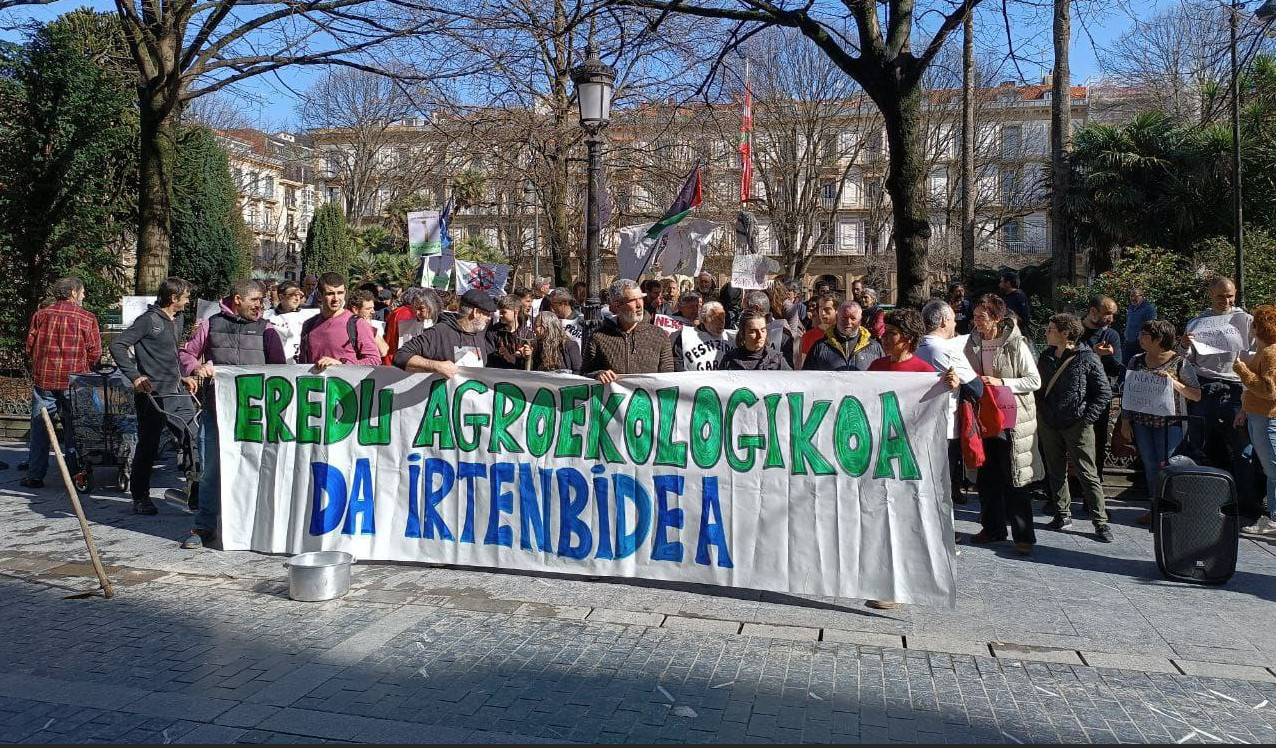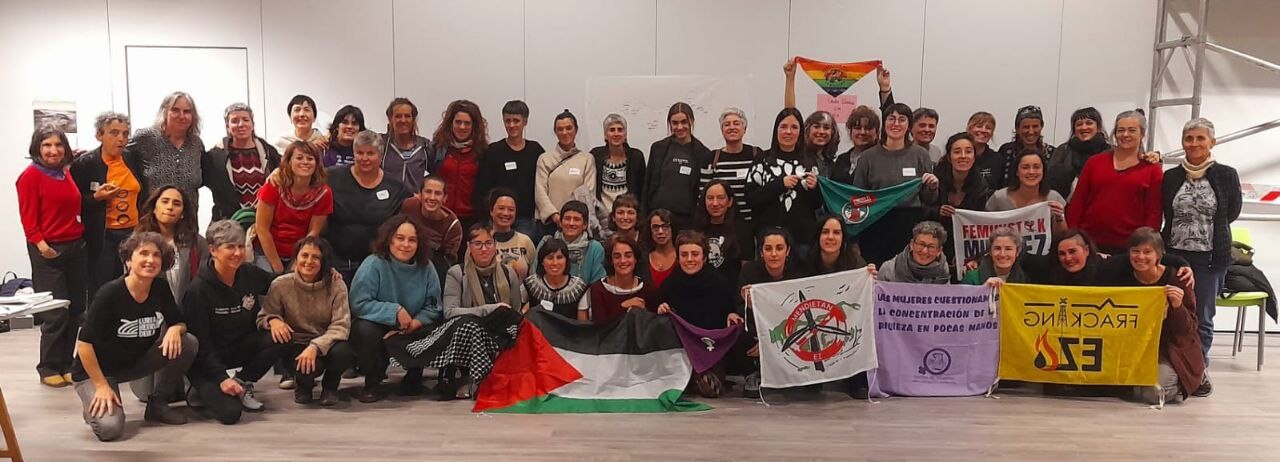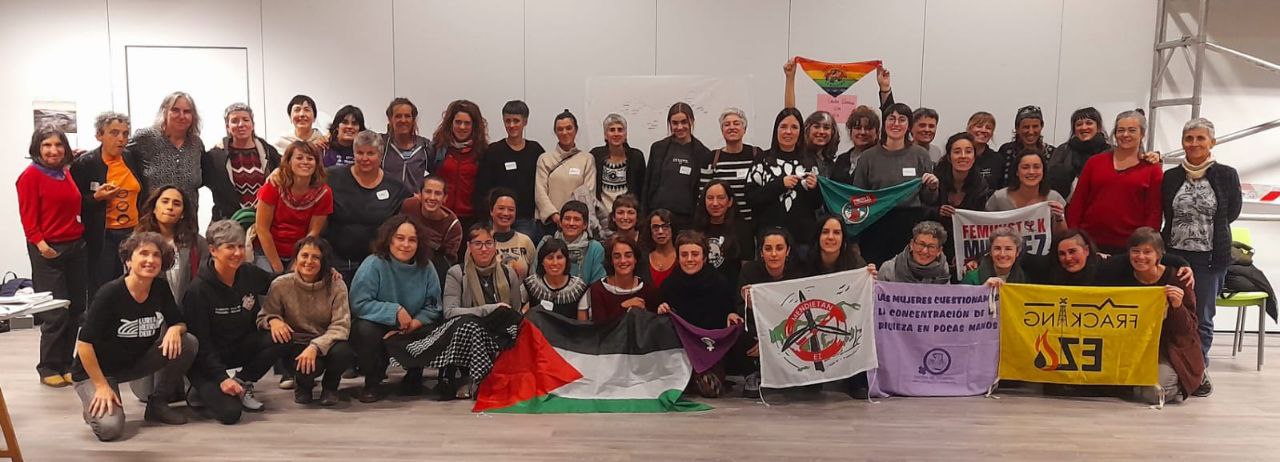What do we dream of? Beyond a shift in a globalised food market
- Five months have passed since the mobilisation of tractors in Catalonia began on 6 February. Mirene Begiristain and Isabel Álvarez have analyzed these mobilizations with ecofeminism goggles and brought to the front line of this article peasants and claims that have remained out of focus.

Lately we are seeing more and more noise in rural areas. But, so far, the rural territorial material – land, water, biodiversity… – and immaterial – knowledge, culture, relations… – has not been estimated or valued. The rural environment has historically been neglected in the social imaginary; the place to leave, as if it did not contribute; and meanwhile, the awareness that the urban environment has become a beacon of “development” da.Eraikuntza is fundamental to understanding what is happening in the rural environment in recent months, and
to understand why the anger of a number of people has arisen. In any case, in addition to understanding these feelings, we must also be able to look beyond the noises and sparks that provoke the mobilizations, and analyze, with eco-feminist glasses, to what extent these mobilizations are transformative, both in their content and in their form.
The common agricultural policy has not been called into question.
The first evidence is that the rural environment suddenly feels the protagonist, at least in some moments it feels under the spotlight, and after a continuous periphery it has historically been transferred to the center. This creates the logical sensation of being in front of a window of opportunity. In a context of high precariousness, in which the primary sector is drowned by debts and bureaucracy, everyone needs to be looked at, they need attention, but we must ask ourselves: Where's the attention going? What is he highlighting in this context of opportunities? Do the centers really change or just the decorated ones?
In this respect, the second evidence is that the main focus of mobilisations (and of the sector itself) has been the Common Agricultural Policy (CAP). This policy originated in the attempt to generate food autonomy for the European continent in the context of the post-war period. Today, the market is a market-centric tool, a globalised market based on an absolutely unfair system in which the small always loses. In the mobilizations there has never been a request for change from this center; while going around, the motion seeks to make dizziness as minor as possible. Yes, it is public money, it is the most important item in European budgets (about 30% of the EU budget), but today that item is led by a capitalist logic and the one with the most soil receives more. The big owners win, while the middle ones try to survive and the little ones stay out of the pie distribution. And, with exceptions, property remains in the hands of men. In fact, only 30% of the aid goes to the producer women – today it is impossible to obtain data from non-binary people – and also the amounts they receive are lower due to the productive model and the scale they choose.
There is talk of agricultural policy rather than food policy.
The same sector that requires limiting the entry of products from other countries exports on a daily basis
To make a real transformation, you have to change what you put at the center. At the heart must be territories and food producers, and not the competitiveness that drives the market and land grabbing and “resources” (monetary and physical). The market drives the vision of the foreigner as an invader, without taking into account that the borders are two-way, and that the same sector that requires limiting the entry of productions from other countries, exports its products every day in the opposite direction; for example, many productions from Morocco have capital from the Spanish State among its main shareholders, and the only reason to produce there is the minimization of costs – labor, ecological, fiscal… – and the maximization of private profits.
Even today there is a figure in agriculture, the so-called “family aid”, which works for free and without any rights.
At the same time, turning around the market that capital proposes means forgetting life; that is, not noticing and neglecting how the chain that feeds capital is maintained. It means not being aware of the hands of the product – often rationalised people and too often those who do so in bad conditions or in slavery. We do not take into account that today there is a figure in agriculture, the so-called “family aid”, which works for free and without any rights. We have it fully standardised, although it is fundamental in the food sector.
Nor does it take account of the fact that the products most linked to the conservation of land and which put life at the centre, in most cases, are not the subject of the CAP or receive derisory amounts, becoming invisible among the invisible. No one looks at them, not even now, for them there are no windows of opportunity in these mobilizations. In fact, these mobilizations talk about Agricultural Policies instead of Food Policies, and food is reduced to another commodity, without a view that incorporates a vision of rights, without a right to adequate food and nutrition; or without a vision of care, without understanding that the food chain is part of the support of care, sinking on the invisible side of the capitalist iceberg. In order to talk about rights and care, we have to rely on production models that are respectful of people and the planet.

Invisible jobs performed by women
Much has been said about the burden of bureaucracy on mobilisations. Who is responsible for this bureaucracy on a daily basis?
In addition to the CAP, there has been much talk in the mobilizations of the increasing burden of bureaucracy on producers. At this point, we can ask ourselves: Who is dealing with this bureaucracy every day? Historically, the women of the villages have had to hear that they were not peasants, “they just made papers.” Now, the demand has moved to the centre, when the workload of the bureaucracy has become unbearable with voluntary work and the cost it entails has become visible, but historically those who have supported (again) in the private space of the houses and without any consideration or recognition have been ignored. At a time when demand has become important, the voices of those who know this work well and those who suffer it have hardly been protagonists.
It has also been called local in mobilizations, nearby marketing channels, zero kilometer. We all know who has been in charge of bringing the product to the market, of collecting and preparing orders… we know the time it takes to carry out the management and marketing, we know that they are very important in any project. One point: The Duina project, a study that evaluated the costs and times of the ecological horticulture projects of Gipuzkoa and Bizkaia, has specified that the commercialization and management/bureaucracy represents an average of 30% of the time in relation to all tasks.
We have to talk about monetary viability, but also about whether the projects are stimulating and whether all the work is showy and valued.
There is a lot of talk about achieving viable productions, but are they stimulating? We must talk about monetary viability, but also about whether the projects are stimulating and whether all the works that underpin them are spectacular and valued. Talking about this means talking about what tasks are valued, how are the economic and non-economic rights of baserritarras women, the ownership of the land, who has contributed historically and the impacts it has generated; who has assumed family care in its entirety, that is, the inequalities that have occurred within the acclaimed “family farming”; how all this has led many women to leave the field, to make their own chainsaws.
Food must be an alliance with a basic social consensus.
Talking about all this means becoming aware of who we want to leave our food, our territory, our rural environment. Because the hunger for capital sees nothing but the environment as a resource to continue to be satisfied. So who will feed us? Who cares for us? These are two chained questions, without which no transformative answer will be found. Food production, when done with respect for the common territory, is a social function and a political decision. Today, the generational shift is an untenable burden and too close to the nightmare, and in order for it to be a viable and real dream, it must be held collectively and open up new possibilities. Valuing the tasks that sustain life is a fundamental struggle and food must be an alliance with a basic social consensus.

The collision of models more present than ever
In the mobilizations, an invisible minority is the farmer who is implementing agroecology, who works from the collective perspective projects linked to the territory, related to the care of the environment, healthy eating and the demand for rights.
Who makes the decisions and who are the visible faces? Who put them in the center and who put them in the periphery, invisible? The minority, the periphery, which cannot be seen in the mobilizations, are the ones that question the global market model. The so-called “green revolution” in the middle of the twentieth century, the intensive productive model devised and driven by the capitalist prism, has led the sector to indebtedness and disappear, but re-sells the false dreams of the “green and digital revolution”, is the last blow. Recently, the protests of tractors opposed to mega-projects in some territories also repeat the individualistic view ("not in my lands") without analysing how to respond to material needs (food, energies...) collectively and in a community. In the mobilizations it is an invisible minority that is implementing agroecology, which works from the collective perspective projects linked to the territory, to the care of the environment, to a healthy diet and to the demand for rights... even if it is the least sustained model in public policy. This minority remains invisible, they are marginalised, because their centre is far removed from the circuits of big capital. Model shock is more present than ever.
The trending topic benefits the neoliberal discourse and those of the extreme right, noise, trouble, fights
While this is the case, the hegemonic model, which revolves around the CAP, remains visible, the model of large machines and large markets. The trending TOPIC, noise, katramil, confrontation benefit the neoliberal discourse and those of the extreme right. This has been more evident in some territories than in others; not so much, for example, in the three territories that make up the Basque Autonomous Community. But beyond noise, you have to look at the deeper interests. Basically, we see that there is a debate about who has the legitimacy to represent the rural environment. In this options window is the strategy to increase the volume of the tumult, on the one hand to listen to the corresponding acronym salsa and, on the other, to not go beyond the demand for tax sales, environmental sales, bureaucratic sales... They're short-term patches. What real impact will all of this have on the lives of most farmers? What is the point of rebates if the land and the agri-food system are getting worse every day?
The transformation that will lead us to dream the future together will hardly come from the organizations and acronyms anchored in the past. It is necessary to think about the key process and focus on the agreed manifestos, understanding mobilizations as an instrument rather than an end, to achieve profound changes beyond noise and to shake up consciences. Although the CAP and the modern production pattern have incubated the gene of “let the one who can save himself”, it is necessary to leave individualism and make it clear that the primary sector is not unique or homogeneous, but that the reality is varied, from agroecology to intensified family projects, and beyond. Alliances and collective strategies are not the easiest way, and although they are times of emergency, trust is slowly burned. Feminism has shown us that beyond thinking about individual and collective anger, fraternity is the way to dream and build more just and democratic proposals. It has shown us that political training with a feminist perspective allows us to create our own speeches.
It is clear that there is a need to rethink mobilisations and negotiations. Through strategic institutional alliances, it is necessary to work proposals that involve long-term demands and influences to take them to the streets and to practice. Through the collapse and hacking of the system, with daily disobedience that violates power, it is necessary to create new forms of social reproduction. That we see the centrality of food linked to care and territory in our lives; that they generate reflection and practical debate in the political and social spheres, in line with the Manifesto for Food Sovereignty of Navarra, that enables the agroecological transition by addressing the production and consumption of the hand (agri-ecological food for all! as the rudder says).
They have to be mobilisations to see what we are already doing; because we are already doing a great deal, collectively and in a Community way, even though the available resources are scarce. Yes, it is necessary to dream collectively and to provide positive and radical support in the mobilizations for a feminist agroecological proposal. Beyond the noise, the tumult and the burn that arises from individual rabies, from collective and constructive rabies, ask ourselves what dream we want to share.

















